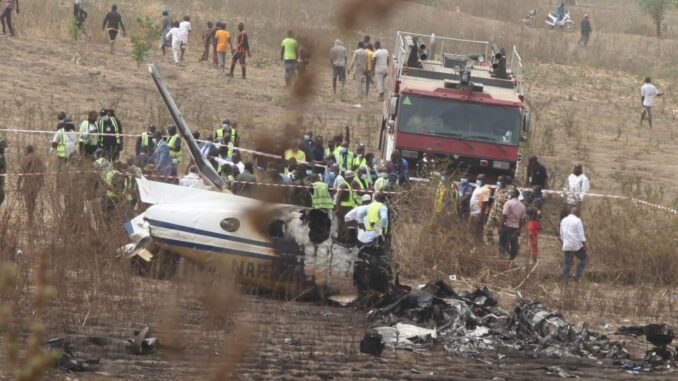
The unfortunate death of seven officers of the Nigerian Air Force in the ill-fated crash of military aircraft NAF Beechcraft King Air B350i is a tragic end to the service of young military officers on national assignment. It is also another major blot in the history of the country’s Air Force. Coming at a time when the country is deeply enmeshed in myriad difficult security situations, while at the same time mobilizing resources for rectification, this incident is disheartening and lamentable.
The crash claimed the lives of the following occupants of the aircraft: Flight Lieutenant Haruna Gadzama (Captain), Flight Lieutenant Henry Piyo (Co-Pilot), Flying Officer Michael Okpara (Airborne Tactical Observation System (ATOS) Specialist), Warrant Officer Bassey Etim (ATOS Specialist), Flight Sergeant Olasunkanmi Olawunmi (ATOS Specialist), Sergeant Ugochukwu Oluka (ATOS Specialist) and Aircraftman Adewale Johnson (Onboard Technician).
According to reports, the military aircraft was said to have crashed while returning to Abuja airport after reporting engine failure on the way to Minna, Niger State. Witnesses also reported that they “saw the plane struggling to turn around and get back to the airport before the plane exploded.”
As if to counter the Nigerian tragedy, at about the same period as the Abuja mishap, a Boeing 777 of the United Airlines flying from Denver, developed engine failure, caught fire and fell apart, scattering debris in a Colorado neighborhood. However, unlike the Nigerian military plane, the Boeing aircraft landed safely, and there were no casualties.
Apparently, the NAF aircraft was on an official mission, possibly, from unconfirmed reports, to do with the pupils who had been abducted by bandits prior to the crash. Whether this was the situation or not, there should not be a total assumption that the crash was a pure accident. Its cause need be unraveled even if to prevent a recurrence. The military should not foreclose the possibility of foul play by mischief makers. After all, the military had, in the fight against insurgents, been ambushed in a manner suggestive of sabotage. At a time when the Nigerian Armed Forces are suffused in challenging tours of duty characterized by broken chains of command, low morale and treachery, the heroic acts of these young Nigerian Air Force officers are worthy of commendation.
One quality worthy of mention is the conscientiousness and extra-ordinary display of caution even in the face of imminent death. These young pilots and crew should be commended for their dexterity and handling of the aircraft which, from accounts, they were able to manoeuvre and prevent collision with houses and human settlements. The eventual sacrifice of their lives is an attestation of their heroism and professionalism.
Sadly, death of Nigerian Air Force officers in accidents happens to be the second in recent times, following the unfortunate death of 24 year-old Flying Officer Tolulope Arotile, acclaimed as the first-ever female combat helicopter pilot in the Nigerian Air Force and one of Nigeria’s finest. That these deaths have come in quick succession calls for concern, even if it is not unusual in war situations and crises of insecurity to have such casualties. Nigeria’s elite squad in the military should not be exposed to avoidable situations that put them in jeopardy. Accidents like this should be avoided in order not to demoralise soldiers.
No doubt, the families, well-wishers and friends of the deceased officers as well as with the Nigerian Air Force and military establishment in general are devastated by the crash. Nigerians deeply commiserate with them. It is important however that they and all Nigerians remain steadfast and be undeterred by this mishap.
Studies in the last 10 years have shown that human incapacitation, weather condition, and maintenance factors were implicated in aircraft accidents. A recent analysis also showed that all accidents that occurred in Nigeria from 1985 to 2010 using the Human Factors Analysis and Classification System (HFACS), a conventional framework widely used in aviation, were occasioned by skill-based error, inadequate supervision and environmental factors.
Nigerian service personnel are some of the best trained in the world. However, barring all indications of tardiness on the part of regulating authorities in the provision of safe air transport whether civil or military, stakeholders in the maintenance arm of aviation should work harder to ensure that routine oversights are given to human errors as they are accorded to technical failures. Of special consideration here is the recommendation that optimum attention be given to the aero medical conditions of pilots and aircrafts engineers. Beside human factor, training focusing on key performance issues should be enhanced for inspectors, data analysts in the regulatory authorities and accident investigators.
END

Be the first to comment